How Much Magnesium Should I Take for Leg Cramps at Night?

It’s the middle of the night, and all of a sudden, you’re awakened by a sudden jolt of pain. Nighttime leg cramps can ruin your restful sleep and leave you wondering why they happen and if there’s a way to end them. In this article, we’ll explore why you get leg cramps and some strategies…

It’s the middle of the night, and all of a sudden, you’re awakened by a sudden jolt of pain. Nighttime leg cramps can ruin your restful sleep and leave you wondering why they happen and if there’s a way to end them.
In this article, we’ll explore why you get leg cramps and some strategies to help prevent them and get a restful night’s sleep.
What Causes Leg Cramps?
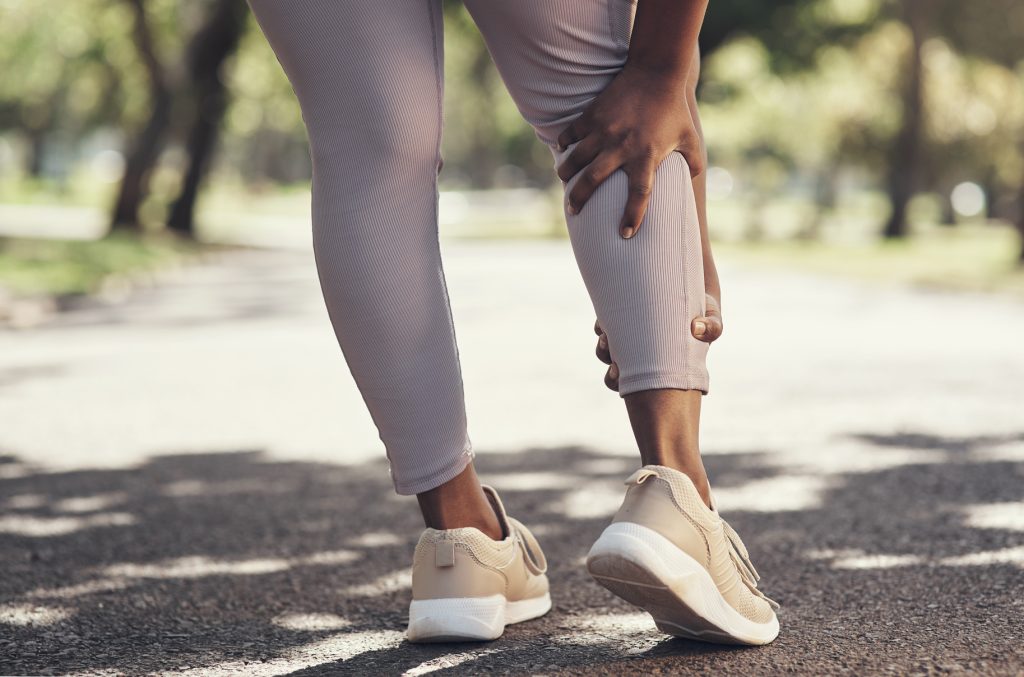
There isn’t a singular identified cause of nighttime leg cramps. Instead, there are multiple factors. Let’s take a look.
Muscle Fatigue
While often thought that dehydration or lack of electrolytes causes muscle cramps, research on exercise suggests that muscle cramps may be due to muscle fatigue.
In a study involving 120 athletes, researchers compared the blood electrolyte levels between those who experienced leg cramps and those who did not. Surprisingly, the two groups found no significant differences in electrolyte levels.
However, the muscles experiencing cramps exhibited higher electrical activity than those that did not. Researchers proposed that increased muscle activity and fatigue, rather than electrolyte loss, may be associated with cramping.
Another study seemed to minimize the role of dehydration and lack of electrolytes as a cause of cramps. Thirteen participants completed exercises to cause muscle fatigue and cramping. They either drank an electrolyte solution or were prohibited from drinking at all.
Nine participants who consumed the electrolyte drink and seven prohibited from drinking water experienced muscle cramps. With 69% of participants still experiencing muscle cramps while properly hydrated and supplemented with electrolytes, researchers suggest muscle fatigue as the most likely cause.
Lack of Movement
In contrast to athletes and younger people, leg cramps in older adults could be due to a lack of movement. A study of 272 adults aged 60 and older compared the frequency of leg cramps to low physical activity levels. Results showed a strong link between less physical activity and more cramps, suggesting that encouraging exercise could help treat these cramps.
Medications
Muscle cramps can emerge as a side effect of various medications, with some specifically affecting the legs. While the overall incidence is low, certain drugs stand out in association with leg cramps. These include :
- Intravenous iron sucrose
- Conjugated estrogens
- Raloxifene (Evista)
- Naproxen (Naprosyn)
- Teriparatide (Forteo)
Additionally, studies note leg cramps associated with medications such as :
- Clonazepam (Klonopin)
- Citalopram (Celexa)
- Celecoxib (Celebrex)
- Gabapentin (Neurontin)
- Zolpidem (Ambien)
Medical Conditions
Various medical conditions are associated with leg cramps. They include :
- Peripheral vascular disease
- Coronary artery disease
- Cirrhosis – especially advanced-age patients
- Neurologic diseases like parkinsonism and peripheral neuropathy
- Lumbar canal stenosis
- Cancer treatment-induced nerve damage
- Hemodialysis
- Venous insufficiency
- Pregnancy
Does Magnesium Work for Leg Cramps?
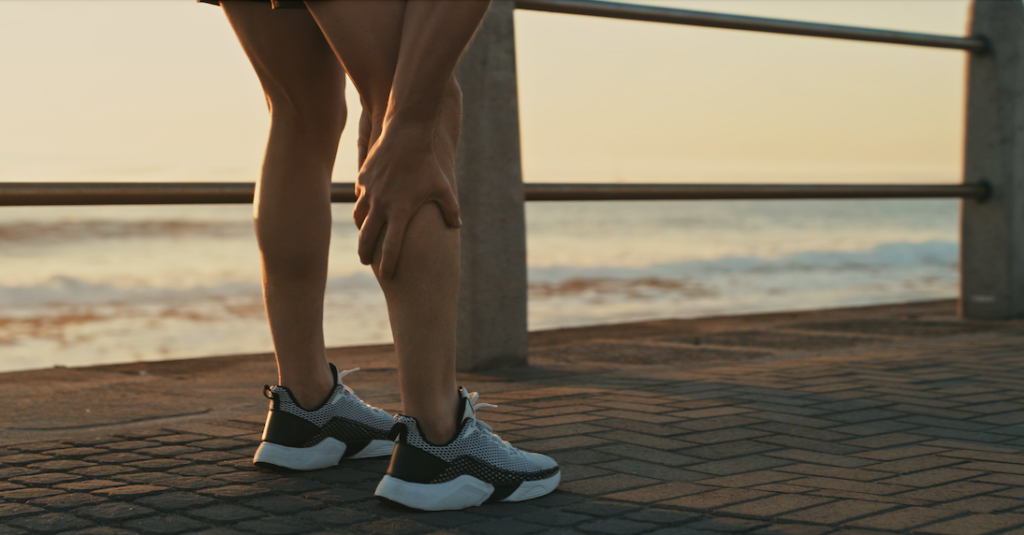
Magnesium is crucial for muscles to work properly. It helps with energy production, moving substances in and out of cells, and the relaxing and contracting of muscles . Not having enough can make muscles and nerves too active, increasing calcium inside cells.
While studies show mixed results on the effectiveness of magnesium for leg cramps, there are some promising studies. It’s important to note that age, overall health, and magnesium absorption may impact the effectiveness of magnesium supplementation.
A study of 175 subjects explored the effects of magnesium supplementation on leg cramps at night. Participants took 226 mg of magnesium oxide at bedtime for 60 days. Those taking magnesium had a greater drop in night leg cramps and better sleep than the placebo group.
Magnesium supplementation could also reduce nightly leg cramps in pregnant women. Seventy-three women with pregnancy-related leg cramps and below-normal magnesium serum levels took 365 mg of magnesium daily for three weeks. Those taking magnesium experienced fewer nightly leg cramps.
A meta-analysis of four studies on the effects of magnesium supplementation during pregnancy found different results. Participants took between 300-360 mg of magnesium daily for two to four weeks. Magnesium supplementation did not affect the frequency of leg cramps.
Researchers did note some limitations of the study. They include a small sample size, inconsistent pain measurement, and lack of a common pain scale.
Another meta-analysis of 5 studies focused on using magnesium supplementation to treat muscle cramps in older adults. There was no significant difference in the number and severity of cramps after four weeks for those taking magnesium supplements than those who did not.
One reason magnesium supplementation may not always be effective is that some studies used magnesium citrate. Magnesium citrate might not be well absorbed by cells , potentially reducing its effectiveness for alleviating leg cramps. In contrast, magnesium oxide increases muscle intracellular magnesium more effectively than magnesium citrate.
Keep in mind that the studies discussed above involved healthy individuals with unidentified causes of nightly leg cramps, excluding pregnancy. If you have or suspect any of the mentioned medical conditions or are on the listed medications, get personalized advice from a healthcare professional to suit your specific health needs.
How Much Magnesium Should I Take for Leg Cramps?
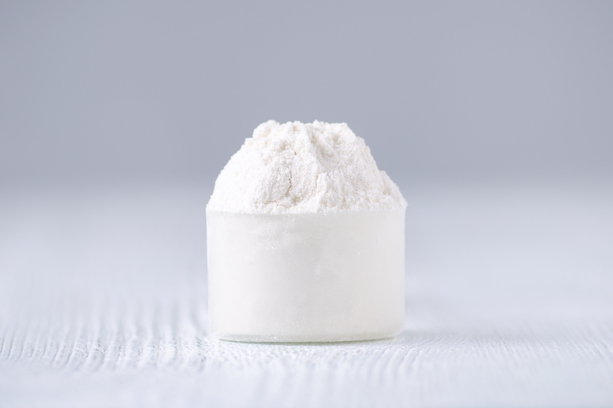
Taking magnesium for leg cramps may only work if you have occasional leg cramps due to a magnesium deficiency. It’s best to work with your doctor to identify the cause of your leg cramps and rule out any serious causes.
The FDA recommends magnesium doses of 410-420 mg for men and 320-360 mg for women, increasing to 400 mg for pregnant women. These guidelines, however, are for the nutritional needs of healthy individuals without existing health conditions. Many people may need more.
In the studies discussed above, magnesium supplementation ranged between 265 to 1,000 mg daily. Base your magnesium needs on achieving optimal magnesium levels. Check out this article for the best tests to determine your whole-body magnesium levels.
If you’re magnesium deficient, you’ll likely need a higher dose. Check out this article if you’re wondering whether taking 500 mg of magnesium or more is too much.
What Are the Best Sources of Magnesium?

Food alone typically isn’t enough to reach optimal magnesium levels. Research estimates that the magnesium content in fruits and vegetables has declined in the last 50 years, and 80% is lost in food processing.
Magnesium Supplements
Turning to supplements like Magnesium Breakthrough can help you meet optimal magnesium intake and optimize your magnesium levels.
Some forms of magnesium used in the studies successfully reducing nightly leg cramps include:
- Magnesium oxide
- Magnesium lactate
- Magnesium citrate
Taking more than one form of magnesium may help reduce leg cramps at night, but also high-quality sleep and virtually every function in your body. Magnesium Breakthrough contains seven forms of magnesium to give your body the support it needs.
What Are Some Other Treatments for Leg Cramps?
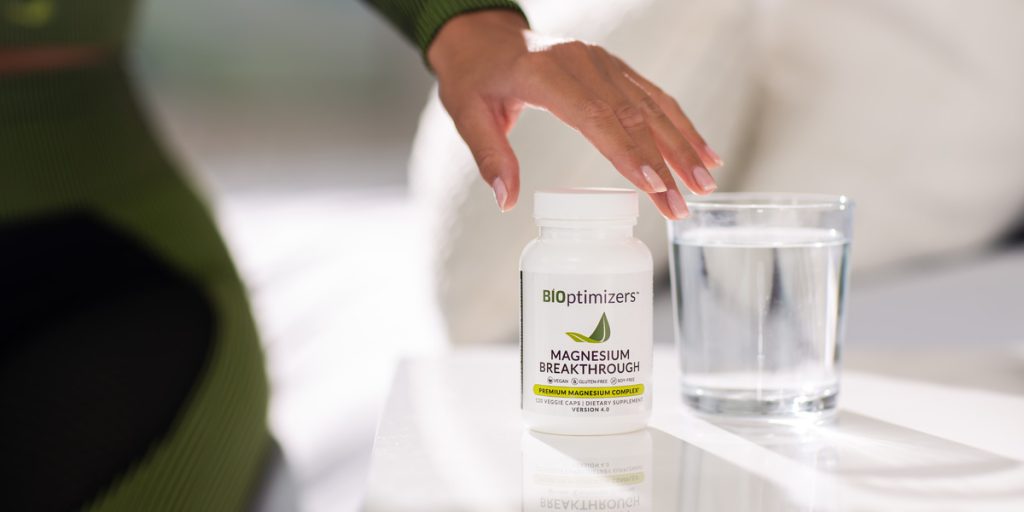
Magnesium alone may not be the solution for your nightly leg cramps. Let’s look at some other strategies to help reduce the frequency of your leg cramps.
Stretching
Calf and hamstring stretches before bed could help reduce leg cramps. A study of 80 adults over 55 explored the effects of stretching on the frequency and severity of leg cramps.
Participants completed hamstring and calf stretches either standing or sitting immediately before bed. They held each stretch for 10 seconds and repeated it three times. Participants who completed the stretches had fewer and less painful night-time leg cramps than those in the control group.
Heat
Applying heat to leg cramps has some anecdotal support from studies exploring possible leg cramp interventions. Apply heat by soaking in hot water with or without Epsom salts or using a heating pad or hot water bottle.
Applying heat widens blood vessels, enhancing blood flow to muscles. The heat also promotes muscle elasticity and stimulates nerve endings to block pain signals.
Massage
Massaging your muscles gently before going to bed and if a cramp occurs can help prevent or reduce the duration of leg cramps. This works by helping relax your muscles.
Pickle Juice
I know it sounds strange, but a study of 12 healthy subjects explored the effects of drinking pickle juice on muscle cramps. Researchers induced foot cramps and gave participants 1mL/kg (.01 oz/lb) of deionized water or pickle juice. Pickle juice stopped the muscle cramps, while water had little effect.
Researchers suggest pickle juice might stop cramps through a nerve response in the mouth, not by rehydrating the body or balancing electrolyte levels.
Conclusion
Nighttime leg cramps can disrupt sleep, but understanding their causes and exploring effective strategies can help you find relief. Here are some steps you can take:
- Test your red blood cell magnesium (not serum) to your body’s magnesium stores
- Take a comprehensive magnesium supplement, like Magnesium Breakthrough, containing multiple forms to provide holistic support.
- Try out some preventative measures like daily stretching before bed. (Let us know if you try the pickle juice!)
- Seek personalized advice from a healthcare professional to tailor your strategy based on individual health conditions and needs.
- Sulzer, N. U., Schwellnus, M. P., & Noakes, T. D. (2005). Serum electrolytes in Ironman triathletes with exercise-associated muscle cramping. Medicine and Science in Sports and Exercise, 37(7), 1081–1085.
- Jung, A. P., Bishop, P. A., Al-Nawwas, A., & Dale, R. B. (2005). Influence of Hydration and Electrolyte Supplementation on Incidence and Time to Onset of Exercise-Associated Muscle Cramps. Journal of Athletic Training, 40(2), 71–75.
- Delacour, C., Chambe, J., Lefebvre, F., Bodot, C., Bigerel, E., Epifani, L., Granda, C., Haller, D. M., & Maisonneuve, H. (2020). Association between physical activity and Nocturnal Leg Cramps in patients over 60 years old: a case-control study. Scientific Reports, 10(1), 2638.
- Allen, R. E., & Kirby, K. A. (2012). Nocturnal leg cramps. American Family Physician, 86(4), 350–355.
- Veronese, N., Berton, L., Carraro, S., Bolzetta, F., De Rui, M., Perissinotto, E., Toffanello, E. D., Bano, G., Pizzato, S., Miotto, F., Coin, A., Manzato, E., & Sergi, G. (2014). Effect of oral magnesium supplementation on physical performance in healthy elderly women involved in a weekly exercise program: a randomized controlled trial. The American Journal of Clinical Nutrition, 100(3), 974–981.
- Barna, O., Lohoida, P., Holovchenko, Y., Bazylevych, A., Velychko, V., Hovbakh, I., Bula, L., & Shechter, M. (2021). A randomized, double-blind, placebo-controlled, multicenter study assessing the efficacy of magnesium oxide monohydrate in the treatment of nocturnal leg cramps. Nutrition Journal, 20(1), 90.
- Dahle, L. O., Berg, G., Hammar, M., Hurtig, M., & Larsson, L. (1995). The effect of oral magnesium substitution on pregnancy-induced leg cramps. American Journal of Obstetrics and Gynecology, 173(1), 175–180.
- Garrison, S. R., Korownyk, C. S., Kolber, M. R., Allan, G. M., Musini, V. M., Sekhon, R. K., & Dugré, N. (2020). Magnesium for skeletal muscle cramps. Cochrane Database of Systematic Reviews , 9(9), CD009402.
- Shechter, M., Saad, T., Shechter, A., Koren-Morag, N., Silver, B. B., & Matetzky, S. (2012). Comparison of magnesium status using X-ray dispersion analysis following magnesium oxide and magnesium citrate treatment of healthy subjects. Magnesium Research: Official Organ of the International Society for the Development of Research on Magnesium, 25(1), 28–39.
- Cazzola, R., Della Porta, M., Manoni, M., Iotti, S., Pinotti, L., & Maier, J. A. (2020). Going to the roots of reduced magnesium dietary intake: A tradeoff between climate changes and sources. Heliyon, 6(11), e05390.
- Hallegraeff, J. M., van der Schans, C. P., de Ruiter, R., & de Greef, M. H. G. (2012). Stretching before sleep reduces the frequency and severity of nocturnal leg cramps in older adults: a randomised trial. Journal of Physiotherapy, 58(1), 17–22.
- Blyton, F., Chuter, V., & Burns, J. (2012). Unknotting night-time muscle cramp: a survey of patient experience, help-seeking behaviour and perceived treatment effectiveness. Journal of Foot and Ankle Research, 5, 7.
13.
4 Comments
Leave a Comment
You must be logged in to post a comment.

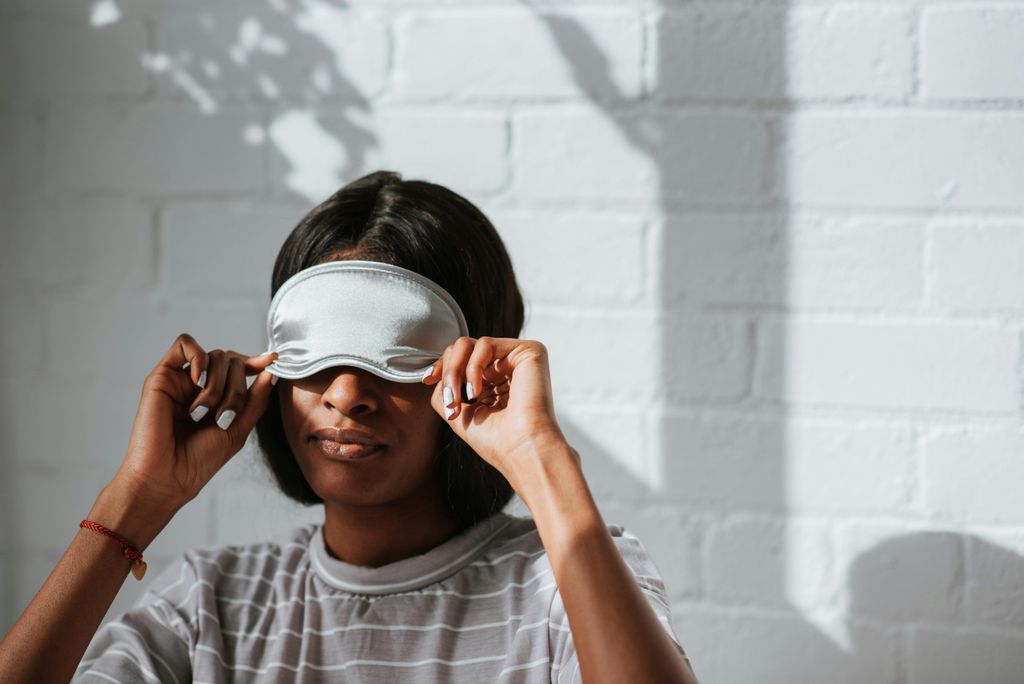



Pickle juice is awesome for treating leg cramps. Its an almost instant relief. Been doing this for years and it absolutely works.
Thanks so much for sharing your experience! It’s great that you’ve found a natural and effective remedy that works well for you as odd as this one may sound.
interesting news
I needs to spend some time learning much more or understanding more.